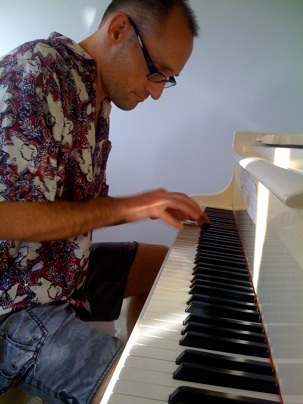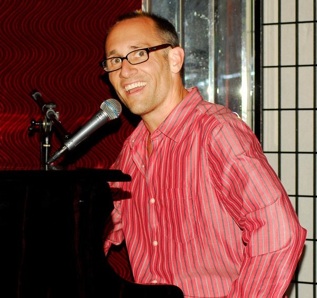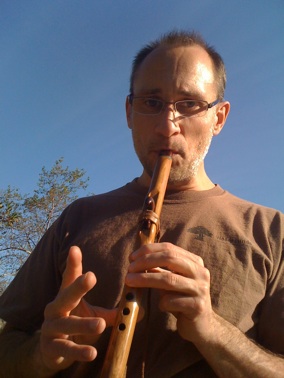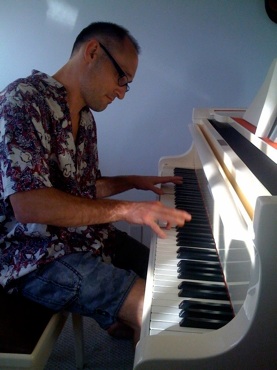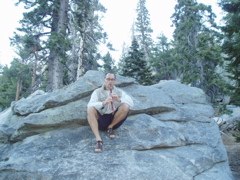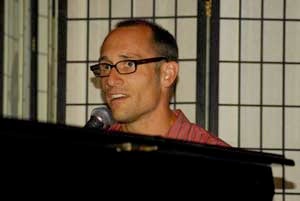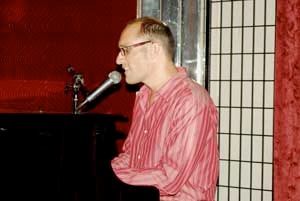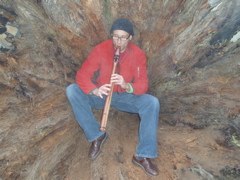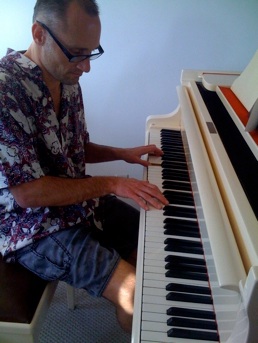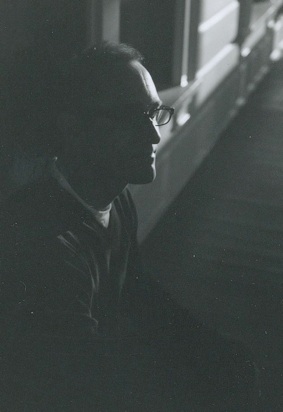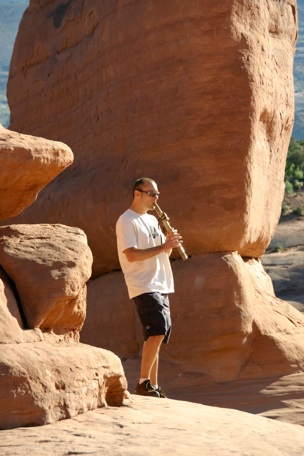I reviewed Roth Herrlinger’s solo piano debut,
Transluscent, earlier this year and really enjoyed it. Roth is currently working on music for his second piano CD as well as recordings of Native American flute. He also helps to establish businesses that can make this a healthier and happier world. Roth obviously has a very interesting story, so read on!
KP: Hey Roth! I know it’s supposed to be warm and sunny in Santa Monica all the time, but it’s still cool and drizzly up here on the Oregon Coast, so let’s not even talk about that! How are things in southern CA today?
RH: It's pretty much summer all the time in Santa Monica, Kathy. Having grown up in Ohio, it was kind of strange to discover that there are places on the planet where it's always 70 degrees and sunny -- not that I'm complaining!
KP: I lived in CA until five years ago, so this has been quite a change, too! Anyway, I recently reviewed your 2009 release Translucent and really enjoyed it. When did you become a Whisperings artist?
RH: I became a Whisperings artist in 2010. I'm really grateful to be a part of this amazing worldwide community of artists.
KP: Have you performed in many Whisperings concerts yet?
RH: I performed in a Whisperings concert in Santa Monica with David Nevue and Amy Janelle this past January, which was really wonderful. I also host a concert series in Santa Monica, where I've performed with several other Whisperings artists, including Michele McLaughlin, Scott D. Davis, and Joseph Akins.
KP: Are you working on more solo piano music for a new CD?
RH: Yes, I'm really excited about my new CD, which I'll record later this year. I've been composing for the past several months, and plan to get into the studio this fall.
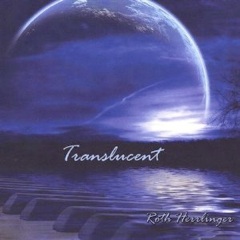
Click the cover to read Kathy's review
KP: I read that you also play Native American flute and have some demos recorded. Do you plan to release a CD of those pieces, too?
RH: I plan to record a CD of Native American flute pieces, and another of flute and piano duets, but I think they'll have to wait until 2013 because I'm having so much fun creating my new solo piano CD!
KP: Do you play any other instruments?
RH: When I was younger, I used to pick up new instruments all the time, mostly out of curiosity. But these days, I mostly focus on piano and indigenous flutes. The reason I started playing flutes, actually, is because I wanted to take an instrument with me when I went hiking - and you can hardly imagine a less portable instrument than a piano!
KP: That’s for sure! Some of the pieces on Translucent have really interesting stories. Let’s talk about some of them. Tell us about “Walk On Water.”
RH: There's a really cool story behind "Walk On Water." A couple weeks after Ray Charles died, he came and visited me in a dream. I told him about a song I was thinking of writing, and he said, "Aw, baby, I know that song" -- and he sat down at a piano and played and sang the whole thing. Usually, I don't remember songs from my dreams when I wake up, but in this case I remembered the sound of the song (not the notes, but the rise and swell) and the story it told. I wrote down everything I recalled, then set it aside and forgot about it. Talking to a friend a year later, I remembered about the song. He suggested that the next time I meditated I should ask Ray to sit down with me and play it. I thought my friend was nuts, but I did what he suggested, and “Walk on Water” came, exactly as I remember it from the dream. Awesome, huh?
KP: What a great story! How about “In Your Dreams”?
RH: A friend and I once decided to see if we could dream together, so we made a conscious decision to do so one night. The next day we found that we had shared the same dream (with absolutely no pre-determined context -- I'm not kidding!). I now believe we can meet each other in our dreams if we choose to. This recording is an instrumental version of the song; the lyric version has the chorus, "I'll meet you in your dreams tonight, far beyond the Earth and stars, and we'll walk in fields of paradise, claim the Universe as ours."
KP: And “Your Victory” (my favorite on the album)?
RH: I'm thrilled that your favorite piece is “Your Victory,” Kathy. In a lot of ways, it's my favorite, too, though I think its subtlety causes it to be missed by many. It was actually composed (or I could say that I received it) in one take. A poet friend, Devin Grace, and I had gotten together to collaborate on some music. She read me one of her devotional poems, that simply goes, "Rest your head -- I am your pillow. Lay down your sword -- I am your victory." I clicked on the recorder, sat down at the piano, and out of me came this beautiful song, just as it is now recorded on the CD. To me, this song is about coming home... it is about arriving at the end of the journey... it is about the victory of life, and, ultimately, of resting at the end.
KP: “Sunflower” has a great story as well.
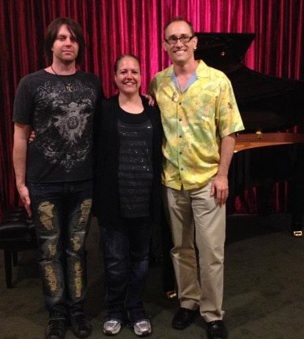
With Scott D. Davis and Michele McLaughlin.
RH: Leave it to kids to give us the best feedback. I played an early version of this song for a middle schooler, and he commented that it ended wrong, because sunflowers grow UP, and my song ended with the music going DOWN. He was right -- I changed it to end on an UP phrase.
KP: Okay, now let’s find out some more about you. Where were you born and raised?
RH: I grew up in Cincinnati, Ohio, went to college in New Hampshire, lived in Russia for a few years, then moved to Northern California for graduate school in business in the mid-'90s, and to Santa Monica in 2003. There you have it -- my life story in one sentence!
KP: Are any of your family members musicians?
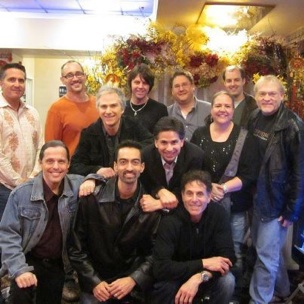
Whisperings at NAMM 1/12. Back row from left: John Otott, Roth Herrlinger, Scott D. Davis, Philip Wesley, Tim Neumark. Middle row: Joseph Akins, Gary Girouard, Michele McLaughlin, David Nevue. Front row: Jeff Bjorck, Joe Yamada, Louis Landon.
RH: My brother is a wonderful pianist and vocalist, and my sister is a great vocalist as well. My mother loved to play piano, and though my dad was a little tone deaf, I think he was the biggest music appreciator of us all.
KP: You mentioned that you traveled extensively with your family as a child. Where did you visit?
RH: My parents loved to travel, and they managed to create amazing experiences for us as a family. One summer, we went to Kenya and Tanzania; another spring we went to the Galapagos Islands, Ecuador, and Brazil; and we traveled all over the U.S., Mexico, and Canada. I feel so blessed to have had such adventurous parents! Travel really shaped a lot of my life, giving me a huge appreciation for people, cultures, languages and music far beyond our own.
KP: What inspired you to move to Russia, and when was this?
RH: I majored in Soviet Studies at Dartmouth College during the Gorbachev era of glasnost and perestroika in the late '80s. I studied in the Former Soviet Union for a couple of semesters, and watched the Berlin Wall fall (on television) at the end of 1989. When the Soviet Union fell two years later, I moved back to Russia to help start a company to assist with the transition to private enterprise and invest in entrepreneurs. I knew I had a rather unique perspective on what was transpiring at that time, and figured I could help this culture I had really come to care for. Starting a company at age 24 was a lot of fun, but it also showed me how much I still had to learn about business, so a few years later I decided to get my MBA at Stanford, which is what brought me to California.
KP: Tell us more about your “day job.”
RH: I'm a business consultant, executive coach, and entrepreneur. I mostly pick the areas of society where I'd like to see changes, and then help to create businesses and organizations that address them. I like to think of it as painting the world the way I see that it can be -- kinder, fairer, freer. I've had this viewpoint since I was a kid, and it's the same perspective that took me to Russia in my early twenties. I want to make the world a happier, healthier place for all of us. Come to think of it, that's what inspires my music, too.
KP: That’s really impressive, and how wonderful that you are able to do this! When did you start playing the piano?
RH: I've seen photos of myself with my fingers on the piano keys when I was barely old enough to stand up.
KP: Did you take lessons? If so, for how long?
RH: I began taking Classical lessons when I was eight, and studied for a decade.
KP: Were you encouraged to compose or improvise by your teachers?
RH: My instruction was solely in Classical piano, so while I learned a tiny bit of music theory, I didn't get any formal support in composing or improvising. I had a photographic memory for music as a child -- I would memorize a Beethoven sonata by the second or third time I'd played through it -- so I can understand why my teacher focused mostly on having me learn more and more complex Classical pieces.
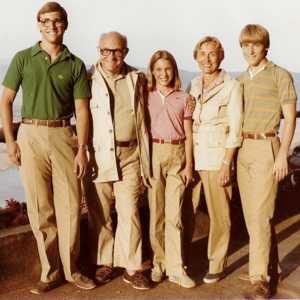
The Herrlinger Family. Roth (on left) at age 14.
KP: When did you start composing?
RH: I played in a band in high school, and had an unrequited crush on the lead singer, so I wrote music to some of her poems in the hopes that she'd pay more attention to me (oh, the joys of being a sophomore…). In the spring of my senior year in high school, I performed a solo recital of Classical music, and then decided to take the summer off from practicing. When I got to college in the fall, I was way out of practice, and didn't make the cut for piano lessons. I was shocked, but it turned out to be the best thing that could ever have happened to me musically. I was fascinated by George Winston's music, and taught it to myself from cassette tapes. And I began to find my own musical voice, my own style, as well. I would sit at the piano in the upstairs hall of the performing arts center evening after evening, playing as people came and went, alternating between George's music and my own. And I could see the impact that my music had on others, and how I interact with people through my fingers on the keys.
KP: Who and what do you consider to be major influences on your music?
RH: Having parents who loved music was probably the most important influence for me. I heard all sorts of music when I was growing up. Traveling around the world expanded my horizons enormously. I remember being transfixed by music played on homemade instruments in East Africa and South America -- so beautiful!
KP: What has been your most exciting musical moment or experience so far?
RH: The day after September 11, 2001, after having stayed up pretty much all night, I wrote a song called "Call To Honor." It was very different from any other song I'd ever written -- words and lyrics that just poured out of me. Many musician friends helped to polish the song and get it recorded, and three weeks later I was able to bring it to firehouses and radio stations in New York City. It was such a challenging time for our nation, and yet, as people came together to help each other, so beautiful.
KP: Is there a particular philosophy that you try to convey in your music?
RH: My music is about emotion and connection and experience. Whatever I'm feeling, that's what I'm playing….
KP: Who are some of your favorite composers?
RH: Well, I was first influenced by the Classical composers (especially the Russians, like Rachmaninoff and Khachaturian, and the French, like Satie), and then by New Age composers like George Winston and David Lanz.
KP: Who are some of your favorite performers?
RH: I love piano-driven pop! Billy Joel, Elton John, Bruce Hornsby, Marc Cohn, Tori Amos…. They're all so inspiring to me, and so much fun to watch!
KP: If you could have any three wishes, what would they be?
RH: I would wish for all of us to know the truth of how beautiful and ultimately divine we all are… and then the other two wishes would be unnecessary.
KP: What’s up next for you?
RH: I'm having the most fun ever composing this new CD! I'll compose through the summer and into the fall, and will probably get into the studio towards the end of the year. I'll continue my concert series in Los Angeles, and I’m planning a performance with Michele McLaughlin in Salt Lake City later this year, which I'm really looking forward to. I'm also working on a super-secret new business that's crazy exciting, which my partners and I plan to launch in the fall as well.
KP: Is there anything else you’d like to talk about?
RH: I'd just like to thank you so much for taking the time to interview me, Kathy, and for all that you do to bring visibility to piano artists through your website, CD reviews, and interviews. It's been a real pleasure getting to know you.
KP: Thanks, Roth, and best wishes in all of your exciting endeavors!
For more information about Roth Herrlinger and his music, please visit
his website and his
Artist Page here on MainlyPiano.com.
Kathy Parsons
July 2012

